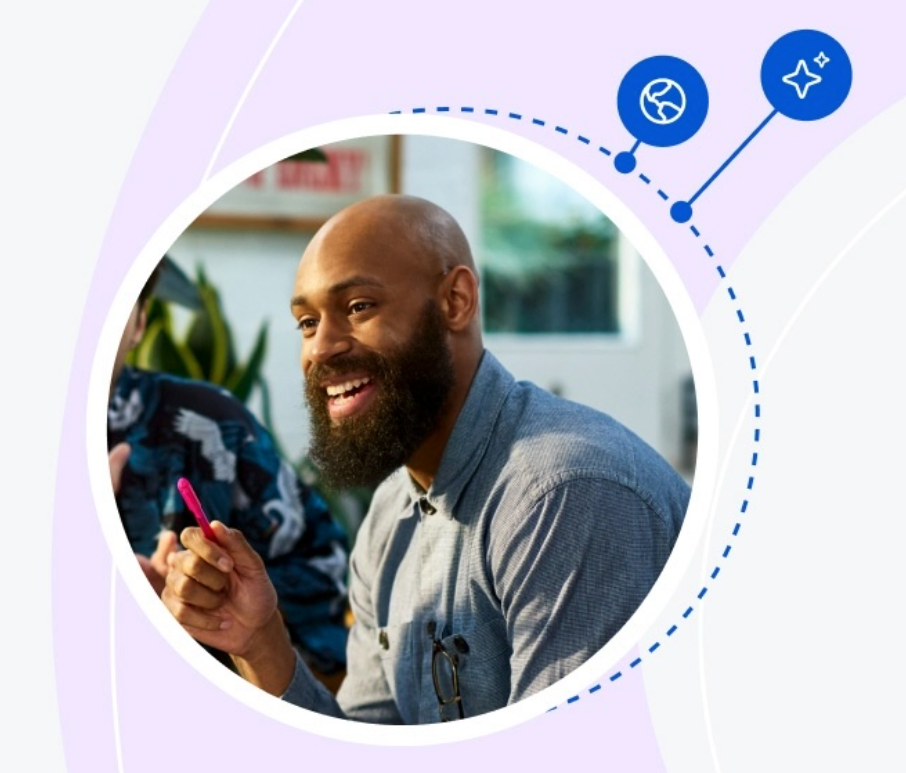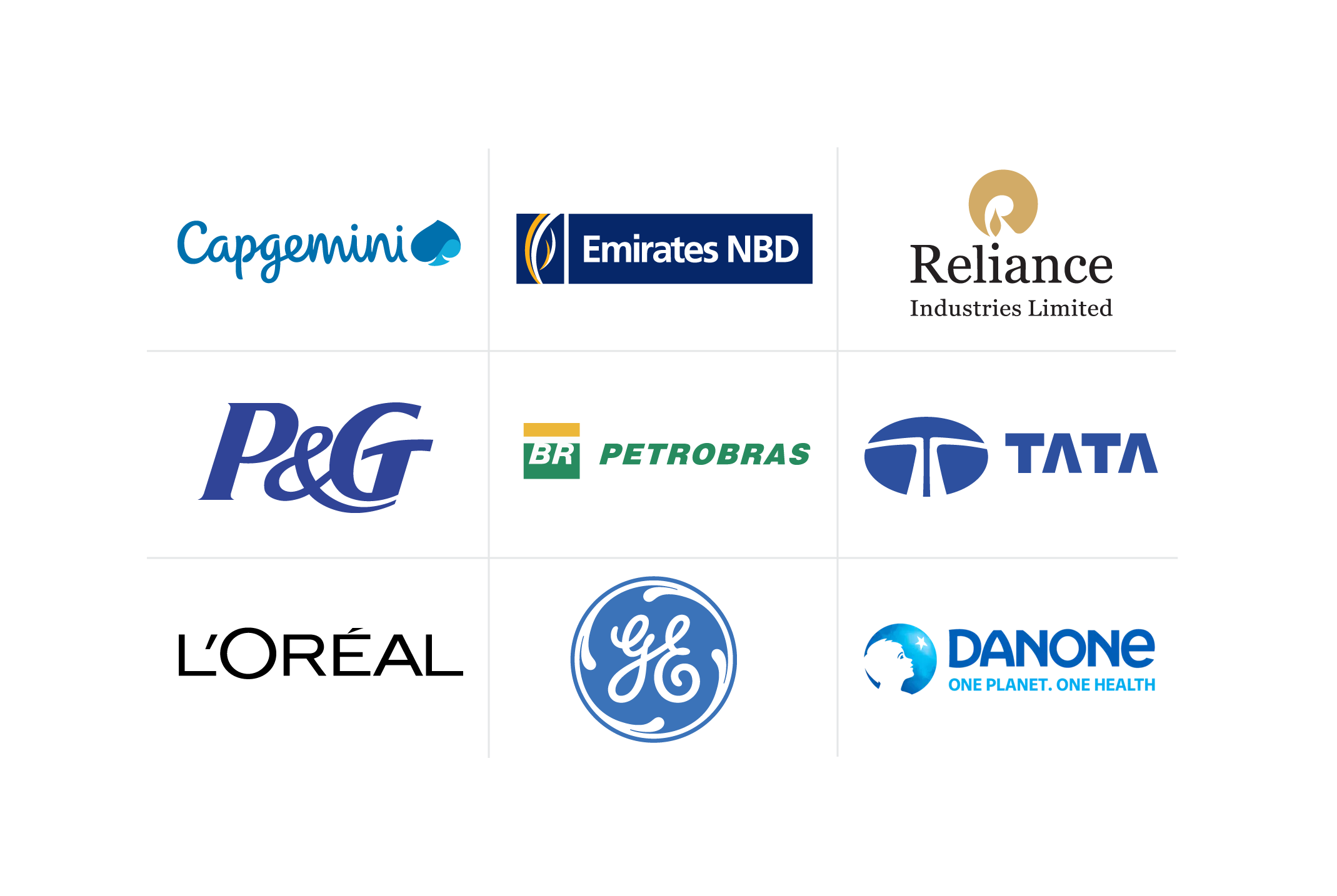Transforming Corporate Training with Personalized Learning
Personalized learning offers a way for corporate training to meet the individual learning goals of employees, enhancing learning speed and job satisfaction. Explore how you can leverage this educational design for your organization.
![[Featured Image] Two men talk to each other while seated in front of a computer during a personalized learning session in an office setting.](https://d3njjcbhbojbot.cloudfront.net/api/utilities/v1/imageproxy/https://images.ctfassets.net/2pudprfttvy6/4LBVLbw5atZvCtBamkk0Q1/1a303b9fbd7ffcbcd1953e596ecee978/GettyImages-1759433536.jpg?w=1500&h=680&q=60&fit=fill&f=faces&fm=jpg&fl=progressive&auto=format%2Ccompress&dpr=1&w=1000)
As corporations change in response to technological innovation, the way in which employers encourage professional development within their workforce has to evolve to meet new demands. Standardized training programs for your employees can often miss the mark on addressing modern learning needs, which can hinder learner engagement and reduce the effectiveness of development programs.
Personalized learning is a dynamic strategy that reshapes how your company can train its employees, helping to enhance employee satisfaction while increasing the pace at which employees build skills. According to a study, 92 percent of the employees surveyed stated that some type of formal training in the workplace increased their engagement with their job in a positive way [1]. This article explores what personalized learning is, how it relates to professional development, and ways to implement it within your organization.
What is personalized learning?
Personalized learning is an instructional approach designed to tailor learning experiences to the individual needs of your employees, such as current skills, professional roles, and career interests. As online learning becomes more popular, different types of personalized learning models have emerged to meet the needs of learners across varied settings.
At the center of personalized learning is the idea that a person’s prior knowledge can be the basis of the learning plan, and the pace and material are then designed to guide the learner from their current level to the goal point. This type of design is typically learner-driven, meaning the learner is actively engaged and has a voice throughout the education process.
The power of personalized learning in the corporate landscape
In the corporate context, personalized learning means creating customized learning plans for your employees based on their current knowledge base, learning style, and professional objectives. To maintain a competitive workforce, companies need to provide ways for employees to enhance their skill set and develop within their roles while advancing toward their career goals.
Unfortunately, many “one-size-fits-all” corporate training programs have high attrition rates, often attributed to their outdated design. While this method might have once made sense from a financial standpoint, offering personalized learning to your employees is now seen as a way to attract new talent, reskill current employees, and show investment in the in-house workforce. Personalized learning approaches offer a way to increase employee engagement in training programs, which in turn raises employee satisfaction and loyalty to the company over time.
How to engage modern corporate learners
Engaging modern learners requires understanding their needs and leveraging the right tools and strategies to meet them. At a high level, prioritizing personalized learning strategies can encourage a lifelong learning mindset among employees. By providing learning opportunities that are directly aligned with the career paths and interests of your employees, you can cultivate a culture where they value and pursue continuous development. Supporting personalized learning paths also shows your organization’s commitment to each employee’s unique needs and growth, promoting an appreciation of diversity in learning and development.
When considering corporate engagement within each learning plan, incorporating real-world scenarios and projects can improve engagement by guiding employees through how to apply their knowledge in real-world contexts. This has the added benefit of helping employers stay aware of employee readiness for certain job responsibilities.
How to implement personalized learning strategies in corporate training
To successfully implement personalized learning, organizations must first understand the characteristics of their workforce and the training needs of each employee. As an employer, you can:
Conduct assessments.
Use skills assessments to gauge your employees’ knowledge, skills, and learning preferences. This data can serve as the foundation of personalized learning path design. It’s also valuable to consider the baseline abilities required for different roles within your organization and assess how your employees’ current skill sets align with the needs of the position.
Set individualized goals.
Collaborate with your employees to set personalized learning objectives that align with their career aspirations and your organization’s goals. This helps maintain autonomy in the employee learning pathway and a learner-led learning environment.
Create customized learning plans.
Based on your employees' assessment outcomes and your organization's goals, you can create learning content that addresses specific needs. Offer content in various formats (known as blended learning) to meet different learning styles and increase engagement. You can also allow employees to learn at their own pace and offer options for when and where they engage with training materials.
To make curriculum design easier, leverage technology platforms that can deliver personalized learning experiences at scale and take time to hire or consult experienced instructors. Finally, you might even consider providing some sort of formal record of achievement or even a certificate to recognize an employee for completing the training.

Monitor progress.
As with any new program, make sure you monitor the progress of your learning plans to determine which approaches are effective and which ones are not. When needed, make adjustments and work with your employees to design and modify programs until you find the right fit.
Tips for measuring the impact of personalized learning on employee performance
Measuring the effectiveness of personalized learning plans needs to go beyond the completion of modules. By taking time to properly assess whether your employees are meeting their learning goals, you can validate the value of your programs and identify areas for improvement. Consider the following assessment methods:
Track key performance indicators (KPIs) related to job roles before and after training
Conduct regular skill assessments to evaluate employee progress
Gather feedback from your employees about what works and what doesn’t
Collect data from learning systems to analyze engagement patterns
Addressing challenges and ensuring efficacy
Tackling the challenges and making personalized learning work for everyone in a company means looking closely at two main areas: how you use technology and how you check if personalized learning really works.
Data collection and recommendations
Employing personalized learning means gathering a lot of data so you can effectively create learning experiences that fit each person. When doing this, it’s important to consider privacy and security, ensuring that employees are aware of how you collect their data and share personal information.
Once challenges with data collection are overcome, the next step is to look for biases within artificial intelligence and personalization algorithms. While the intention is to design unbiased algorithms based on “facts” alone, many tools and algorithms have shown built-in biases that skew their recommendations.
When using personalized learning algorithms, companies must recognize this issue and take steps to ensure the designs of their learning plans are as objective as possible. This includes having space for modifications, ensuring employees have some level of autonomy over their learning objectives, and designing learning pathways.
Program effectiveness
Many people also have questions about how effective personalized learning is because limited research has validated or invalidated it compared to traditional learning methods, but others, especially in the corporate space, believe personalized learning contributes to the goals and career aspirations of their employees. To meet objectives, personalized learning plans need to take into account several factors, including alignment between instruction and curriculum design, along with the technical learning tools available for employees.
As more companies maintain systems monitoring how well these personalized learning programs are doing, you’ll have more information to help inform the future design of effective programs within your workplace. This means defining clear goals and a way to measure progress towards these goals. The idea is to go beyond assuming the programs are helpful and having evidence to show it.
Learn more on Coursera.
The shift towards personalized learning in corporate training is more than just a trend; it’s a response to the changing needs of the modern workforce and the increasing demand for more effective training solutions. By focusing on individual learning paths, companies improve how employees develop skills in the workplace, improving professional growth.
With Coursera for Business, you can train teams across your organization in the skills that matter most in today’s digital economy. Your employees will gain access to content from 350+ leading universities and industry partners, where they can build real-world experience with innovative skills, tools, and technologies while earning globally recognized credentials. Our customizable, scalable learning solutions balance workplace and technical skills training in diverse formats, from video clips to guided projects and Professional Certificates. Accelerate your digital transformation and equip employees to drive growth with Coursera.
Article sources
Axonify. “Axonify Finds No Improvement in Corporate Training in Second Annual State of Workplace Training Study, https://axonify.com/news/axonify-finds-no-improvement-corporate-training-second-annual-state-workplace-training-study/.” Accessed June 18, 2025.
This content has been made available for informational purposes only. Learners are advised to conduct additional research to ensure that courses and other credentials pursued meet their personal, professional, and financial goals.

